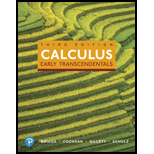
Nondifferentiability? Consider the following functions f.
a. Is f continuous at (0, 0)?
b. Is f
c. If possible, evaluate fx(0, 0) and fy (0, 0).
d. Determine whether fx and fy are continuous at (0, 0).
e. Explain why Theorems 12.5 and 12.6 are consistent with the results in parts (a)–(d).
91.
Trending nowThis is a popular solution!

Chapter 15 Solutions
Calculus: Early Transcendentals (3rd Edition)
Additional Math Textbook Solutions
Elementary Statistics: Picturing the World (7th Edition)
Introductory Statistics
Pre-Algebra Student Edition
A First Course in Probability (10th Edition)
Thinking Mathematically (6th Edition)
A Problem Solving Approach To Mathematics For Elementary School Teachers (13th Edition)
- For the system consisting of the three planes:plane 1: -4x + 4y - 2z = -8plane 2: 2x + 2y + 4z = 20plane 3: -2x - 3y + z = -1a) Are any of the planes parallel and/or coincident? Justify your answer.b) Determine if the normals are coplanar. What does this tell you about the system?c) Solve the system if possible. Show a complete solution (do not use matrix operations). Classify the system using the terms: consistent, inconsistent, dependent and/or independent.arrow_forwardFor the system consisting of the three planes:plane 1: -4x + 4y - 2z = -8plane 2: 2x + 2y + 4z = 20plane 3: -2x - 3y + z = -1a) Are any of the planes parallel and/or coincident? Justify your answer.b) Determine if the normals are coplanar. What does this tell you about the system?c) Solve the system if possible. Show a complete solution (do not use matrix operations). Classify the system using the terms: consistent, inconsistent, dependent and/or independent.arrow_forwardOpen your tool box and find geometric methods, symmetries of even and odd functions and the evaluation theorem. Use these to calculate the following definite integrals. Note that you should not use Riemann sums for this problem. (a) (4 pts) (b) (2 pts) 3 S³ 0 3-x+9-dz x3 + sin(x) x4 + cos(x) dx (c) (4 pts) L 1-|x|dxarrow_forward
- An engineer is designing a pipeline which is supposed to connect two points P and S. The engineer decides to do it in three sections. The first section runs from point P to point Q, and costs $48 per mile to lay, the second section runs from point Q to point R and costs $54 per mile, the third runs from point R to point S and costs $44 per mile. Looking at the diagram below, you see that if you know the lengths marked x and y, then you know the positions of Q and R. Find the values of x and y which minimize the cost of the pipeline. Please show your answers to 4 decimal places. 2 Miles x = 1 Mile R 10 miles miles y = milesarrow_forwardAn open-top rectangular box is being constructed to hold a volume of 150 in³. The base of the box is made from a material costing 7 cents/in². The front of the box must be decorated, and will cost 11 cents/in². The remainder of the sides will cost 3 cents/in². Find the dimensions that will minimize the cost of constructing this box. Please show your answers to at least 4 decimal places. Front width: Depth: in. in. Height: in.arrow_forwardFind and classify the critical points of z = (x² – 8x) (y² – 6y). Local maximums: Local minimums: Saddle points: - For each classification, enter a list of ordered pairs (x, y) where the max/min/saddle occurs. Enter DNE if there are no points for a classification.arrow_forward
- Suppose that f(x, y, z) = (x − 2)² + (y – 2)² + (z − 2)² with 0 < x, y, z and x+y+z≤ 10. 1. The critical point of f(x, y, z) is at (a, b, c). Then a = b = C = 2. Absolute minimum of f(x, y, z) is and the absolute maximum isarrow_forwardThe spread of an infectious disease is often modeled using the following autonomous differential equation: dI - - BI(N − I) − MI, dt where I is the number of infected people, N is the total size of the population being modeled, ẞ is a constant determining the rate of transmission, and μ is the rate at which people recover from infection. Close a) (5 points) Suppose ẞ = 0.01, N = 1000, and µ = 2. Find all equilibria. b) (5 points) For the equilbria in part a), determine whether each is stable or unstable. c) (3 points) Suppose ƒ(I) = d. Draw a phase plot of f against I. (You can use Wolfram Alpha or Desmos to plot the function, or draw the dt function by hand.) Identify the equilibria as stable or unstable in the graph. d) (2 points) Explain the biological meaning of these equilibria being stable or unstable.arrow_forwardFind the indefinite integral. Check Answer: 7x 4 + 1x dxarrow_forward
 Algebra & Trigonometry with Analytic GeometryAlgebraISBN:9781133382119Author:SwokowskiPublisher:Cengage
Algebra & Trigonometry with Analytic GeometryAlgebraISBN:9781133382119Author:SwokowskiPublisher:Cengage College Algebra (MindTap Course List)AlgebraISBN:9781305652231Author:R. David Gustafson, Jeff HughesPublisher:Cengage Learning
College Algebra (MindTap Course List)AlgebraISBN:9781305652231Author:R. David Gustafson, Jeff HughesPublisher:Cengage Learning
 Algebra: Structure And Method, Book 1AlgebraISBN:9780395977224Author:Richard G. Brown, Mary P. Dolciani, Robert H. Sorgenfrey, William L. ColePublisher:McDougal Littell
Algebra: Structure And Method, Book 1AlgebraISBN:9780395977224Author:Richard G. Brown, Mary P. Dolciani, Robert H. Sorgenfrey, William L. ColePublisher:McDougal Littell




